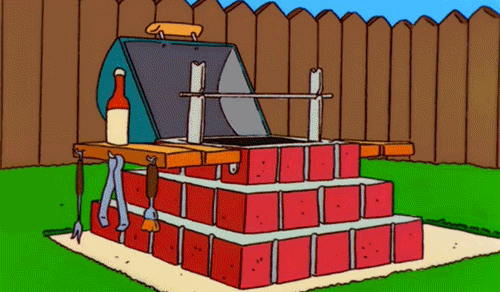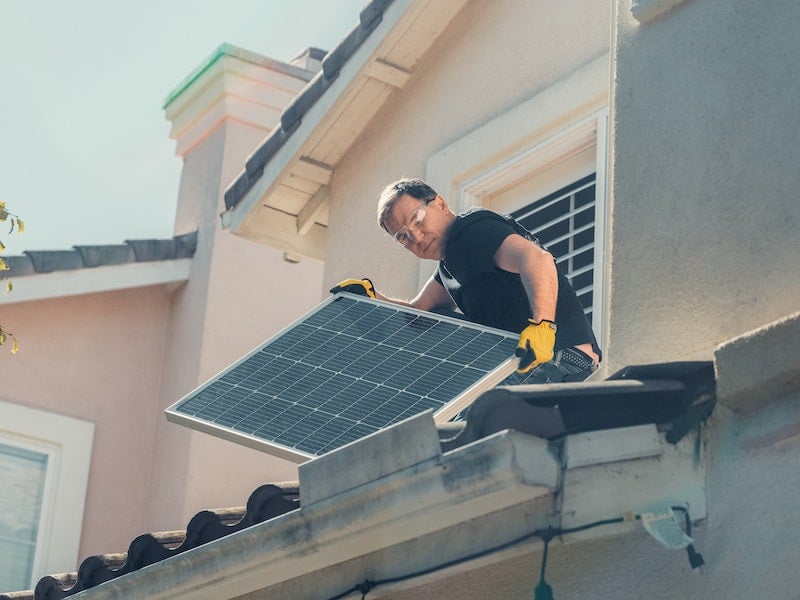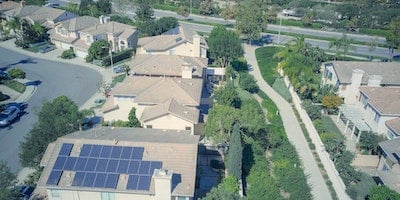
Solar Panel Cost Guide for 2023
See average pricing for solar panels by system size.
In this article:
- Is solar right for you?
- How Much Do Solar Panels Cost for Your Home in 2023?
- What Affects The Cost of Solar Panels?
- How Much Do Solar Panels Cost?
- Solar Panel Cost By Size
- Solar Panel Cost by State
- Cost of Solar Panels by Type
- Dollar Savings from Your Solar Energy System
- Financing Options
- Maintenance & Repair Costs
- ROI: Are Solar Panels Worth the Investment?
- Recent Posts
Is solar right for you?
Find out in less than a minute.
How Much Do Solar Panels Cost for Your Home in 2023?
Purchasing solar panels for your home is an investment and shouldn't be taken lightly. Determining how much you are going to pay for them is just one piece of the equation. Just like any investment you need to know what you are going to be getting in return. Here at EnergyBot, we have a handful of articles talking about solar, its benefits, types, how long they last, and many other topics touching on benefits outside of the energy and dollar savings.
For this article, we are going to walk you through the financials of residential solar panels. Helping you estimate how much you will be spending, what are your purchasing options, and how much you will be saving.
A handful of varying factors determine the cost of solar panels. Type, size, quantity, where you live, size and type of inverter, your installer, and mounting configuration will all affect how much you spend.
Before getting started, our team built a home solar cost calculator. It provides an estimate of what you can expect to pay for your home. We recommend opening it in a second tab. Set your estimate as you read through this article.
What Affects The Cost of Solar Panels?
-
Types of solar panels [LINK TO TYPES OF SOLAR PANELS]
-
Quantity of Solar Panels
-
Quality of Solar Panels
-
Solar inverters
-
Installation costs
-
Utility Fees, Permits, and inspections
-
Local and state tax incentives
-
Financing Options
Types of Solar panels

There are three main types of solar panels: Monocrystalline, Polycrystalline, and Thin Film Solar Panels.
Then there is PERC: Passive Emitter and Rear Cell panels.

The main variant between all of them is their material. For a solar system for your home, you will be considering Monocrystalline or Polycrystalline Panels. PERC is an additional feature, and cost to improve the efficiency of these two material types.
Beyond the main distinctions, dozens of brands and versions of each type exist. Each one attributing to different appearances, efficiency ratings, and price tags.
Check out this post to learn more about the different types of solar panels.
How Many Solar Panels?
It is pretty self-explanatory that purchasing 10 panels will cost more than purchasing 1. So how do you determine how many panels you will need?
Well, that can be another lesson all on its own.
Nonetheless, we'll try to simplify how this is determined as much as possible.
1) How much energy do you consume?
-
-
The first step is determining how much energy your home consumes. You can find this out on your utility bills. You'll want to look for Watt-Hours (Wh) or Kilowatt-Hours (kWh) for the entire year.
-
It is important to remember, you can only produce energy when the sun is up. When looking at how much energy your home consumes, remember, without batteries, you won't be able to offset everything.
-
With Net Energy Metering (NEM), you can offset with cost. This can be done by overproducing when the sun is up and receiving a credit from the utility company at the end of the year.
-

2) How much energy can your panels produce?
-
-
If you have selected a panel type already, it should have a rated capacity in Watts (W), which is power. If one single panel is placed on the equator on a perfectly sunny day at noon, you will receive this rating at that moment.
-
Energy generated, is Watt-Hours (Wh). So, some time must pass. If the panel is outside from noon to 2 PM, multiply the rated power capacity, in Watts, by 2 hours.
-
3) Rule of thumb
You may already see where we are headed, but if you live anywhere other than the equator, you won't receive the exact power capacity of the panels. This means you'll need additional panels to account for that lost energy. However, with proper installation and angling, you can get pretty close on a sunny summer day.
Quality of Solar Panels

Like many things we purchase every day, there are quality options. A peanut butter and jelly sandwich from the cafe downtown that's made with peanuts from local farmers, bread straight out of the oven, and jelly made from the grapes from the local wine vineyards, is going to taste a lot different than a PB&J you bought pre-made from the refrigerated section in the grocery store.
There's nothing wrong with the grocery store PB&J. It gets the job done. But, it was smaller, so you needed to eat two and though it satisfied your craving, it still wasn't as good as you remember from when you were little.
Now that we are both hungry, back to solar panels. Quality matters here as well. It will determine your power rating and therefore how many panels, how long your efficiency rating lasts, how they withstand inclement weather, warranty options, and how soon they'll need maintenance.
Solar Inverters
Inverters convert power from Direct Current (DC) to Alternating Current (AC). Solar Systems produce DC and we use AC in our homes. Thus, they are essential for making solar energy useful.
There are two main types of inverters, string inverters, and microinverters. String inverters are larger and less expensive, but they convert the current from multiple panels in a string. This can lead to losses in efficiency if one panel is shaded or damaged.
Microinverters are smaller and more expensive. They attach to each individual solar panel and can optimize the output of each panel independently. This can result in higher overall system efficiency.
Installation Costs

Labor costs for solar panel installation are highly dependent on where you live. Even in the same state, it's common to find higher labor costs in the city than in the outside rural areas.
Also, consider who you are hiring. Larger solar companies with many years of experience may cost more than a local mom-and-pop shop. But of course, consider every in-between as well.
Quality of labor matters as well. That's not to mean you always get high quality at a high cost. Get referrals when you can or check the company's reviews online.
During high rain and winds, you don't want to be concerned your panels will come off. Also, proper installation matters for the longevity of the wiring and connections.
Utility Fees, Permits, and Inspections

Permits, permits, permits. Everyone's favorite topic insert eye-roll here. When doing any kind of home improvement project, check with your local city building department on the costs of solar installation permits but also permit timelines, fees, and inspections.
If you are serious about installing solar panels, start this process as soon as possible. If you are concerned about cost, it may be beneficial to get a knowledgeable solar contractor to help you with the process. Though permit costs tend to be cut and dry, an experienced contractor may be able to help avoid unexpected hurtles down the line and speed the process along.
Local and State Tax Incentives
Don't forget to check out any opportunities to reduce your cost. Today (2023), there are a lot of rebates and incentives to get your solar projects off the ground and onto your roof. Particularly, with the approval of the Inflation Reduction Act, make sure to get your credit on your next tax return.
Learn more about federal tax credits.
You can find more local and state incentives in our energy and solar incentive database.
Financing Options
There are a handful of financing options we will go over in more detail down below. You don't have to have cash on hand to put in a full high-quality solar energy system. You can lease a system, take out a loan, or get a Power Purchase Agreement (PPA).
How Much Do Solar Panels Cost?
Alright, let's go over some real numbers on how much solar panels cost. Depending on how you are determining solar panel cost, we have broken up the data of cost in several different ways.
-
Size
-
State
-
Type
The average 10 kilowatt (kW) residential solar panel system costs $20,000 - $25,000 after the federal solar tax credit is applied. Smaller systems are cheaper but there are some upfront costs to make any solar system work. Inverter(s), permits, utility fees, and inspections are needed regardless.
When determining the cost of your solar system, you will quickly find estimates of the cost in dollars per watt. Below is an estimate of how that pricing is broken down. Expect the percentages to change on the size of the system you are installing.
Solar Panel Cost By Size
There is a fixed cost associated with installing a solar panel system. Some equipment you will need to purchase no matter how big your system is. After that fixed portion of the system, it costs about $1,500 per kW you add.
Average Cost of Solar Panels by System Size
Solar Panel Cost by State
Your location will be a large factor in how much solar panels will cost. Your state's solar incentives and labor costs are the main drivers.
Cost of Solar Panels by Type
Cost of mono vs poly solar panels
The costs of solar panels will depend on the type of panel (monocrystalline vs polycrystalline) brand and its watt rating. Generally, monocrystalline solar panels are more expensive than polycrystalline and are regarded as the premium type of solar panel.
The best way to compare the pricing of solar panels is to calculate the cost per watt. Simply take the cost of the solar panel and divide it by the rated wattage. For example:
-
Renogy 100 watt solar panel $97.74 - Cost per watt of $0.97
-
Solaria 370 watt solar panel $485 - Cost per watt of $1.31
Dollar Savings from Your Solar Energy System
This is probably the biggest question: How much money will solar panels save me?
This is also dependent on several factors:
-
How much energy you use
-
How much your energy costs
-
The size of your solar system
-
How much energy your system produces
-
How well you clean and maintain your system
Your solar energy system only produces energy when the sun is up. Therefore, if you get home after 5 pm and turn on lights and appliances, this is energy consumption that is instead coming from the grid and not your solar system.
Let's take a look at some pictures for a better explanation.
A typical residential energy consumption profile has two peaks. One in the morning before everyone heads to work and school. The second one is in the evening when the household returns home and before bed. The middle of the day may be a little higher than the evening depending on where you live. If you have a dog at home, maybe you allow the AC to maintain some cool air while you're gone. At night, outside is already cooler, allowing the AC to not turn on at all.

Now, let's add a solar system. On a perfectly sunny day, with a solar system that is sized correctly, you may see your energy production look something like this.

If we subtract solar energy production from your home's energy consumption, we will suddenly see the graph change.
Notice, the two peaks still remain because there isn't sun available to generate power. However, you have some overgeneration in the middle of the day.
This is where a Net Energy Metering rate from the utility company comes into play. Without batteries to save the over-generation in the middle of the day, that energy goes back to the grid. However, it's not lost. The utility company records the amount of energy received and provides you credit in dollars at the end of the year.

How much money you can save from your panels is dependent on how much energy you produce outside of sunlight hours, the size of your system, as well as the other factors listed previously.
The credit you receive from the utility company from this over-generation amount is not the same rate you pay for electricity. It is typically at a fraction of the cost.
With all that said, it is possible to be net positive at the end of the year for having a solar system. Meaning, you are earning money instead of spending on your electricity bill. This is becoming less likely, as solar becomes more popular and the credit received is less. It is more likely to have a solar system pay for about 80% of your bill. Assuming you live in a relatively sunny state and have a properly sized system.
Financing Options
How you are going to pay for your new renewable energy system is another important question to answer for your investment.
Cash
If money is no issue, paying off your system may be your best option. Just sit back and watch the system reduce your bills. You can still receive rebates and tax credits for your new solar installation.
Incentives, Rebates, & Tax Credits
Incentives, rebates, and tax credits are there for a purpose. They are designed to get buyers over the cost hump. If the initial price tag is too much, consider how much you will save after adding in the available utility and government stimulus.
Loan
A loan is the next best option if you are still looking to get the benefits but want to keep some cash on hand. You are still eligible for all incentives and rebates.
For this option, just consider the type of loan, what your interest rate is, loan length, and if the payments make sense compared to your monthly energy bills.
Lease (Power Purchasing Agreements [PPA])
The last option to consider is a Power Purchase Agreement (PPA) which is a type of lease specifically for a solar system. This method locks in your monthly electricity bill.
One downside to some PPAs, not all, is the length of the agreement. A solar loan agreement works like any other type of loan. Therefore, as the price of energy goes up, so does your solar energy credit. In a PPA with a term of 10 years, your solar tax credit remains the same. You could be losing out on some savings towards the end of your PPA term if your price is locked in but energy prices have gone up.
If you are considering a PPA, look to get a second opinion on the contract.
Maintenance & Repair Costs
Once installed, what are the costs of maintaining your system?
With not many moving parts, you don't have too many costs to worry about. At the same time, don't just set it and forget it for 10 years.
Here are a few things to keep in mind that you may have to do:
-
Panel Cleaning
-
Tree Trimming
-
Inverter replacement after 10-15 years [INSERT HOW LONG DO SOLAR PANELS LAST]
-
Re-roofing after installation
Expect to do panel cleaning and tree trimming 1 to 2 times a year, at least. This is of course dependent on your weather conditions and how fast your tree grows.
You are likely to replace your inverters before your solar panels. Inverters have moving parts inside. These parts last 10 to 15 years. Your solar panels are expected to last 20 to 25 years.
Before installing your solar system, you may be asked how old your roof is. Roofs are expected to last anywhere between 15 to 30 years depending on your location and material. Though it is possible to replace shingles on a roof with a solar system, it definitely makes it harder, which means more money. It may be beneficial to replace your roof before getting your new renewable energy system.
ROI: Are Solar Panels Worth the Investment?
We have provided a lot of information to consider when purchasing a solar power system. Looking to save money by investing in a solar panel system is a popular question today and something to consider with all the rebates, incentives, and tax credits.
Before you buy or lease a solar panel system you should consider several factors to determine if it makes financial sense, or use our solar calculator to compare the cost vs return on investment.
Here are 4 steps you should take to decide if solar is right for you.
Step 1: Review your electric bill
The first step to determine if the cost of solar panels makes sense is to calculate how much you are currently paying for electricity. Your electric bill should include your historical usage by month. Simply find your average monthly usage and multiply it by your electric rate to see how much you are paying for electricity per month and year.
You should also see how much electricity in kilowatt-hours (kWh) you use in a typical month. This will help you determine how much electricity your solar panel system should generate to cover your usage.
Step 2: Calculate solar panel costs
Next, you should find out how much it would cost to purchase a solar panel system. You will need to think about if you are paying all of the costs upfront, financing or leasing your solar system. Our solar calculator can help you get a rough estimate of what a system for your home would cost.
Step 3: Find solar incentives
While all new residential solar systems are eligible for the federal solar tax credit, your state, municipality, or utility may have additional incentives that can drastically lower the cost of your solar panel system.
Additionally, you should find out if your home is in an area that allows net metering. Net metering is a billing system that allows utilities to apply credits to your electricity bill for the extra energy you put back into the grid.
Step 4: Consider Your Solar Impact
While some people are only interested in going solar if they are able to save money, others are willing to pay a little extra for the other benefits of solar. Common reasons people invest in solar include:
-
Reducing carbon footprint
-
Energy independence (i.e. not reliant on the energy grid)
-
Increase home value
Written by Thad Warren
Thad is a native Texan who has worked in the energy industry for just over 5 years.
Connect
Recent Posts
Compare Texas Solar Buyback Plans
Discover the best Texas solar energy buy back programs for 2025! Compare rates, terms, and providers to maximize savings and make the most of your solar investment.
September 2025

7 minutes

How Efficient Are Solar Panels
How efficient are solar panels compared to other types of energy generation?
March 2023

4 minutes

What You Need To Know About The California Solar Mandate
Learn how the California Solar Mandate changes how new homes are built.
July 2023

4 minutes


